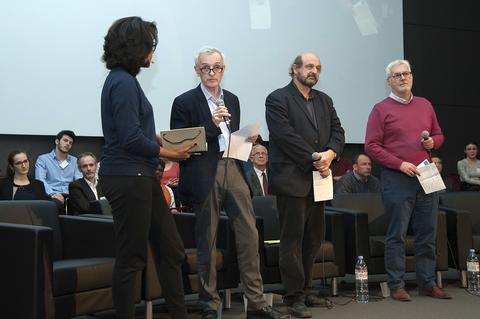
The Finance-Climate Pact made public at Sorbonne University
The Finance-Climate Pact was made public on Tuesday, February 19, 2019 at Sorbonne University, during an event introduced by university president Jean Chambaz on the stage of the packed auditorium of the Pierre and Marie Curie campus.
In front of an audience of VIPs, including former foreign ministers Laurent Fabius and Alain Juppé, the President said he was "stimulated by his students and the commitment of his professors and researchers on climate and sustainable development issues" and stressed that once again, Sorbonne University was keen to support a key moment of mobilization for the climate.

Audrey Pulvar, Jean Jouzel, Hervé Le Treut et Robert Vautard © Sorbonne Université - Pierre Kitmacher
Audrey Pulvar, Jean Jouzel, Hervé Le Treut and Robert Vautard © Sorbonne University - Pierre Kitmacher
The launch of the Finance-Climate Pact was an opportunity for Sorbonne University to affirm its commitment to reducing its environmental and energy impact by involving its entire community, and especially its students.
During the event organized by climatologist Jean Jouzel and economist Pierre Larrouturou, and hosted by Audrey Pulvar, dozens of personalities took the floor to defend a treaty proposed to the European Commission. This environmental protection project proposes to put finance at the service of the Earth and provides for the creation of a European bank for climate and biodiversity, as well as the constitution of a specific fund to promote the transition to a high-energy efficiency and low carbon economy.
Among the speakers, the climatologist Jean Jouzel, Nobel Peace Prize winner as former vice-president of the IPCC scientific group and director of the Pierre-Simon-Laplace Institute (IPSL)1 from 2001 to 2008, recalled the importance of acting today. The climatologists Hervé Le Treut and Robert Vautard, current and future directors of the Pierre-Simon-Laplace Institute, also spoke on the auditorium stage, emphasizing the crucial role of education and research.
Indeed, as a research-intensive university, Sorbonne University sets up specialized and transdisciplinary research programs to meet the major challenges of the environmental transition. Thus, the Sorbonne University Institute for Environmental Transition (SU-ITE) brings together 54 multi-disciplinary laboratories and works on three interdependent scientific axes that respond to the demands of society: controlling the consequences of climate change, creating the conditions for responsible use of resources and energy and, finally, governing biodiversity and drawing inspiration from nature. The institute is involved in some forty bachelor's, engineering and master's degree programs.
In addition, Sorbonne University runs the Climate Graduate School (EUR) on behalf of a group of partners in the Paris region. The aim of this school is to provide training through research, which is visible and attractive at both national and international levels, on issues related to the climate system, climate change and their societal impacts.
1 The IPSL is a research federation of which Sorbonne University is one of the supervisors.
